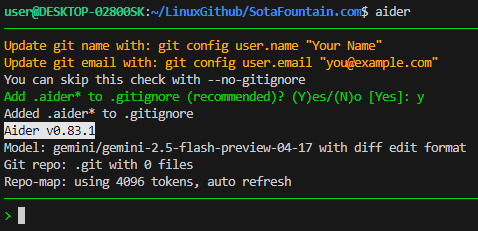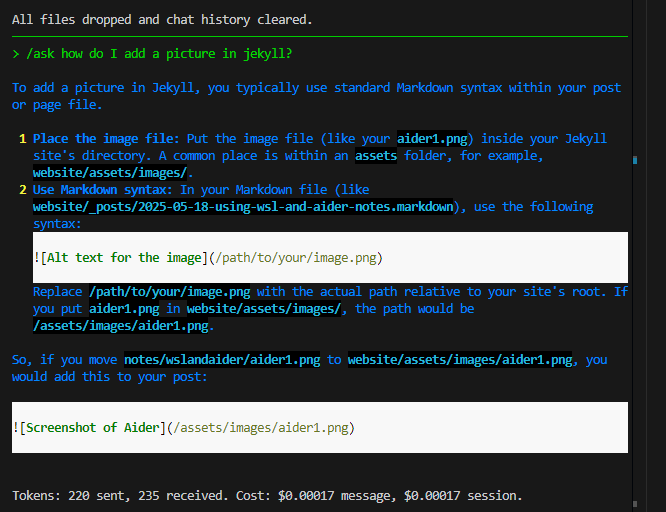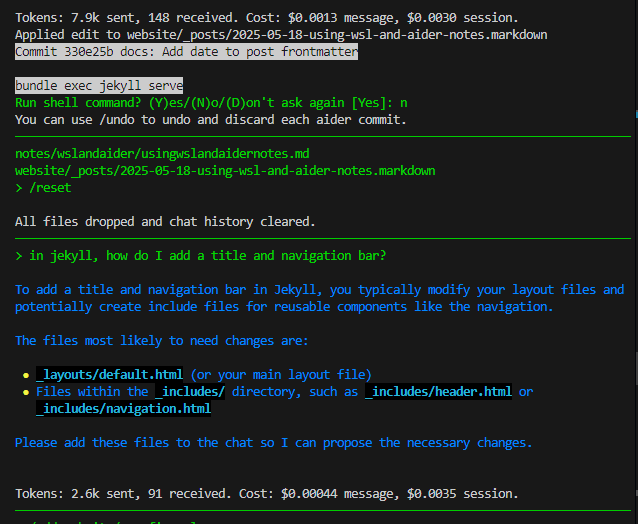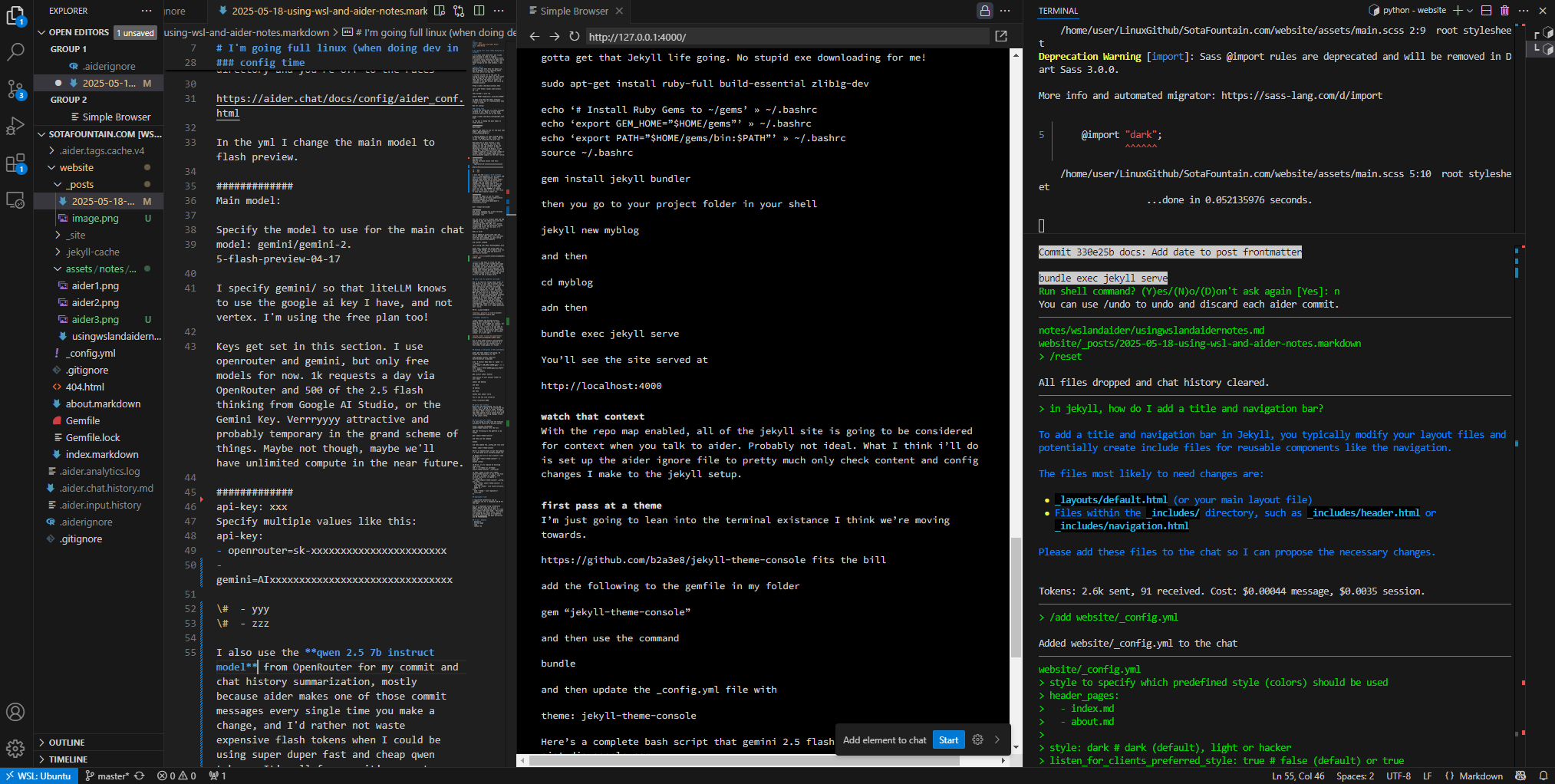I’m going full linux (when doing dev in windows)
I’ve always used powershell and vscode when working on code in windows. Unfortunately I’m now to the point where I actually enjoy checking out open source projects on github, and let me tell ya, those things do not like windows. I get it!
Enter WSL! Obviously real devs know all about wsl, but my dumbass is just learning about this now, and I’m a big fan.
I’ve been turned off in the past by trying to figure out where to store stuff and settings up the ubuntu env and all that, but with the power of aider I’m confident I can get answers and solve my problems quickly.
https://aider.chat/docs/install.html
| curl -LsSf https://aider.chat/install.sh | sh |
That worked! I also ran
export PATH=”/home/user/.local/bin:$PATH”
to make sure that the shell terminal whatever knows wtf I’m talking about when I type in aider.
Now for config!
config time
I think the config yml is pretty straight forward to use. Dump it in your home directory and you’re off to the races
https://aider.chat/docs/config/aider_conf.html
In the yml I change the main model to flash preview.
############# Main model:
Specify the model to use for the main chat model: gemini/gemini-2.5-flash-preview-04-17
I specify gemini/ so that liteLLM knows to use the google ai key I have, and not vertex. I’m using the free plan too!
Keys get set in this section. I use openrouter and gemini, but only free models for now. 1k requests a day via OpenRouter and 500 of the 2.5 flash thinking from Google AI Studio, or the Gemini Key. Verrryyyy attractive and probably temporary in the grand scheme of things. Maybe not though, maybe we’ll have unlimited compute in the near future.
############# api-key: xxx Specify multiple values like this: api-key:
- openrouter=sk-xxxxxxxxxxxxxxxxxxxxxxx
- gemini=AIxxxxxxxxxxxxxxxxxxxxxxxxxxxxxxx
# - yyy # - zzz
I also use the qwen 2.5 7b instruct model from OpenRouter for my commit and chat history summarization, mostly because aider makes one of those commit messages every single time you make a change, and I’d rather not waste expensive flash tokens when I could be using super duper fast and cheap qwen tokens. It’s all free so it’s a moot point for now, but SOMEDAY if compute gets less free than it is now, it’s nice to know where smaller models fit.
########### Specify the model to use for commit messages and chat history summarization (default depends on –model) weak-model: openrouter/qwen/qwen-2.5-7b-instruct:free
Don’t forget dark mode!
########### Use colors suitable for a dark terminal background (default: False) dark-mode: true
You can also turn on verbose mode and add logging so you can really dive into how the tool (aider + litellm) are interacting with the LLMs. It’s pretty interesting to see the different system prompts and tools. For my case, I’ll leave it off for now.
Does it work?
Yes! I added my github info (per the yellow message that aider will send you) with the /git command. so /git config user.name putyourusernamehere
and another command
/git config user.email [email protected]
After this, anytime you allow aider to make a code change, it’ll make a nice lil commit, so you can undo and branch to your hearts content.

note I did have to close out and re-open vscode so that vscode would open my project folder up in WSL mode, which also makes all your extensions (like the github extension) work as expected. I was having some trouble getting extensions to automatically see file updates, but close > reopen vscode fixed it. amazing how turn it off and on always works.
Aider and its wonderful ask mode.
One of my favorite things about aider is the ability to use /ask to answer tiny questions. My most common for a while was about setting up venv and activating them. On top of the raw type of “what terminal commands do i use?” questions, being able to ask for a quick lesson on WHY you even want to do something like set up a virtual env when making a python project is unbelievably helpful. It’s enabled me to learn things, and apply that learning, at a very quick pace. It also has a secondary impact of making unknown problems I have seem a lot less intimidating. There’s not many issues in basic dev work that 2 or 3 good questions can’t solve.
Here’s a good example:

remember context!
/clear removes the message history. Getting shit responses? hit a clear! Keeps files you’ve added for context, but gives you a full, fresh chat context window to use. /reset is if you want to get rid of those files from the context window. Also I’m realizing I didn’t even explain how to add files to the context window. it’s with /add !.

All of this seems esoteric and annoying when you read it, but in practice it’s wild how fast you can interact with a fast model (like gemini 2.5 flash).
basking in the glory of WSL and Ubuntu
gotta get that Jekyll life going. No stupid exe downloading for me!
sudo apt-get install ruby-full build-essential zlib1g-dev
echo ‘# Install Ruby Gems to ~/gems’ » ~/.bashrc echo ‘export GEM_HOME=”$HOME/gems”’ » ~/.bashrc echo ‘export PATH=”$HOME/gems/bin:$PATH”’ » ~/.bashrc source ~/.bashrc
gem install jekyll bundler
then you go to your project folder in your shell
jekyll new myblog
and then
cd myblog
adn then
bundle exec jekyll serve
You’ll see the site served at
http://localhost:4000
watch that context
With the repo map enabled, all of the jekyll site is going to be considered for context when you talk to aider. Probably not ideal. What I think i’ll do is set up the aider ignore file to pretty much only check content and config changes I make to the jekyll setup.
first pass at a theme
I’m just going to lean into the terminal existance I think we’re moving towards.
https://github.com/b2a3e8/jekyll-theme-console fits the bill
add the following to the gemfile in my folder
gem “jekyll-theme-console”
and then use the command
bundle
and then update the _config.yml file with
theme: jekyll-theme-console
Here’s a complete bash script that gemini 2.5 flash made me on aistudio.google.com
# Ensure you are in your project’s root directory echo ‘gem “jekyll-theme-console”’ » Gemfile bundle install
# First, try to replace an existing theme line sed -i ‘s/^theme:\s.$/theme: jekyll-theme-console/’ _config.yml
# Then, check if the line “theme: jekyll-theme-console” is now in the file # If not, it means no ‘theme:’ line existed initially, so append it if ! grep -q “^theme:\s*jekyll-theme-console” _config.yml; then echo ‘theme: jekyll-theme-console’ » _config.yml echo “No ‘theme:’ line found initially, added it.” else echo “‘theme:’ line replaced or confirmed.” fi
Here’s what my VSCode window looks like:

deployment time!
I registered SotaFactory.com on cloudflare.com for a whopping $10.40 for the year.
Now we’re deployed using cloudflares pages, which allows you to pull a directory from github and serve it fresh every commit that gets made. This means free hosting for static sites, and it’s all backed by the power of cloudflare. Unlimited bandwidth and ddos protection and NO FEEEEEEEEEES.
to do - website
- analytics
- welcome page
- logo
- contact me